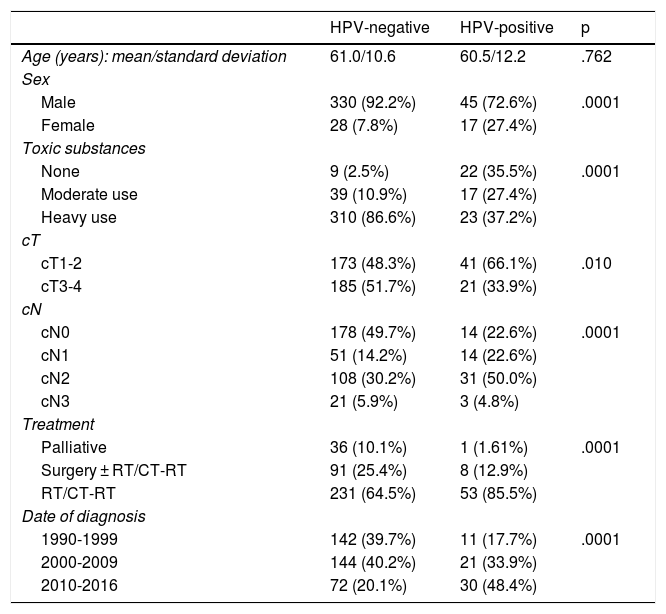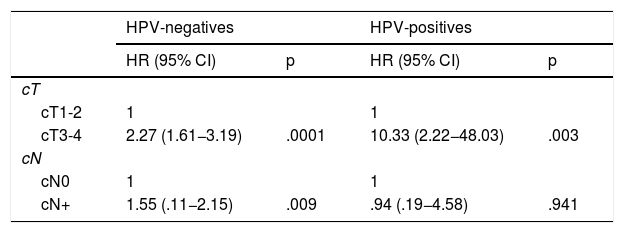Different studies performed in populations with a high incidence of HPV infection have found no prognostic capacity of clinical nodal involvement (cN+) in patients with HPV-positive oropharyngeal carcinomas. The objective of this study was to assess the prognostic ability of nodal involvement in patients with oropharyngeal carcinomas according to HPV status in a cancer population with a low incidence of HPV infection.
Material and methodsRetrospective study of a cohort of 420 patients with oropharyngeal carcinomas treated during the period 1990–2016 for whom information on HPV status was available.
Results14.8% of the patients included in the study had HPV-positive tumours. In relation to patients without nodal involvement (cN0), nodal involvement at diagnosis (cN+) significantly decreased the specific survival of patients with HPV-negative oropharyngeal carcinomas. Conversely, no differences in survival were found for patients with HPV-positive tumours according to the presence of nodal involvement. A history of toxic consumption did not change the absence of prognostic significance of nodal involvement for patients with HPV-positive tumours.
ConclusionsRegional involvement at the time of diagnosis is not a prognostic variable for patients with HPV-positive oropharyngeal carcinomas.
Diferentes estudios realizados en poblaciones con una elevada incidencia de infección por HPV han encontrado una ausencia de capacidad pronóstica de la afectación ganglionar clínica (cN+) en los pacientes con carcinomas de orofaringe HPV-positivos. El objetivo del presente estudio fue evaluar la capacidad pronóstica de la afectación ganglionar en pacientes con carcinomas de orofaringe en función del estatus HPV en una población oncológica con una baja incidencia de infección por HPV.
Material y métodosEstudio retrospectivo de una cohorte de 420 pacientes con carcinomas de orofaringe tratados durante el periodo 1990–2016 de los cuales se dispuso de información del estatus HPV.
ResultadosUn 14,8% de los pacientes incluidos en el estudio presentaron tumores HPV-positivos. En relación con los pacientes sin afectación ganglionar (cN0), la afectación ganglionar en el momento del diagnóstico (cN+) disminuyó de forma significativa la supervivencia específica de los pacientes con carcinomas de orofaringe HPV-negativos. Por el contrario, no aparecieron diferencias en la supervivencia para los pacientes con tumores HPV-positivos función de la presencia de afectación ganglionar. El antecedente de consumo de tóxicos no modificó la ausencia de significado pronóstico de la afectación ganglionar para los pacientes con tumores HPV-positivos.
ConclusionesLa afectación regional en el momento del diagnóstico no es una variable con capacidad pronóstica para los pacientes con carcinomas de orofaringe HPV-positivos.









